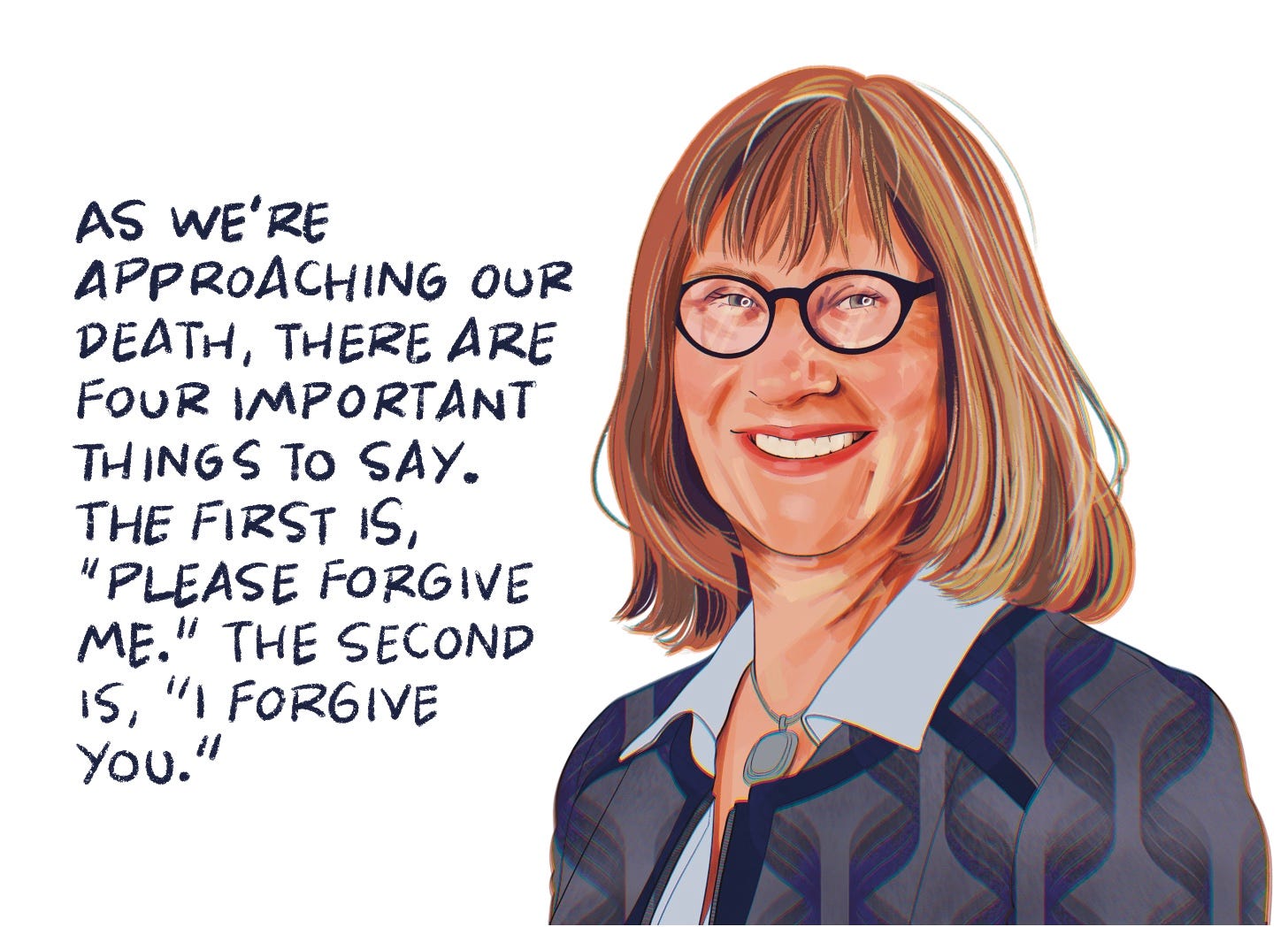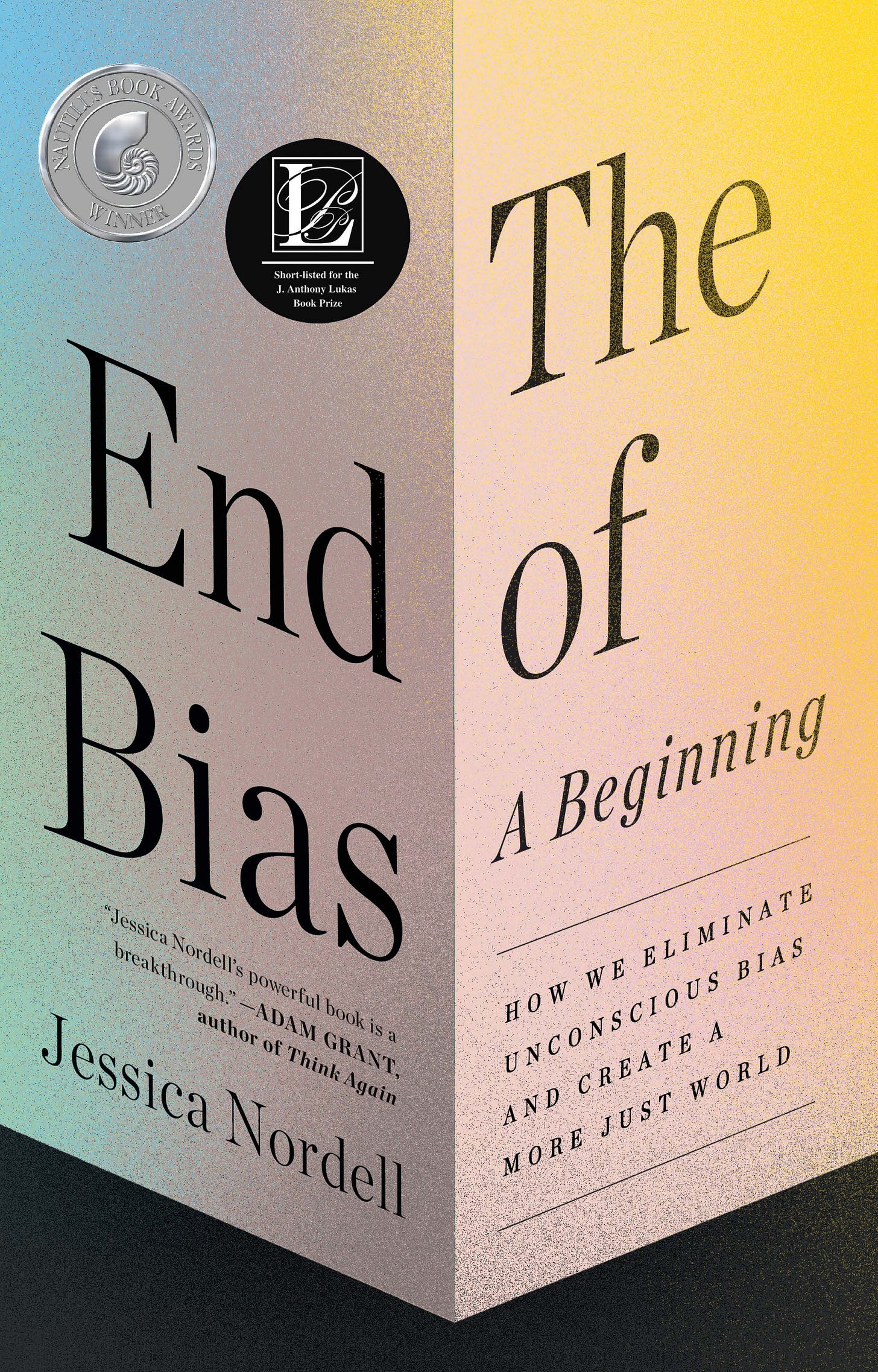Today, the inimitable Brenda Hartman! Therapist, cancer survivor, and all-around Wise Woman of the Upper Midwest, Brenda is one of very few therapists who specializes in end-of-life. At age 32, Brenda was diagnosed with stage 4 ovarian cancer and given months to live. By dint of miracle or biology or incomprehensible-ingot-of-meaning-in-the-universe, she experienced what medicine calls a "spontaneous remission." More than thirty years later, she's still here. She has also been my therapist, guiding me through various life catastrophes. When I learned she was nearing retirement, I panicked and immediately googled "CLONING, LATEST NEWS." Then I invited her to talk with me so I could share her wisdom. Please enjoy Part 1 of our conversation below. (Part 2 will appear next month.)
Jessica Nordell: You have such an interesting story of going into your field. You were diagnosed with cancer at 32 and told that you had 24 months to get your affairs in order. Then you survived.
Brenda Hartman: Prior to getting diagnosed, I was working on two doctorates. My goal was to be a professor and continue doing research in developmental psychology and social work. I was doing a clinical internship in social work.
When I lived, the response was, "Just pick up where you dropped off and act like nothing happened." And so I went back to the internship. While I was doing that, I was trying to figure out what happened to me. What does this mean? Two doctorates? I don't really care—I'm alive! <Laughs.> Having a PhD behind my name really does not matter.
I slowly went into private practice and started accepting cancer patients. It made sense to be able to use my own experience— to sit with people and talk with them about things nobody else would talk with them about.
What were some of those things?
"I think I'm going to die." "I want to stop treatment because this isn't working and everyone thinks I'm giving up." "I'm terrified."
It really took some time and doing my own therapy— initially about that fact that I'm alive. How do I make sense of being alive when everyone told me to prepare to die?
I can only imagine. How did you make sense of that?
I'm still working on it. <Laughs.> Everyone says, "Oh, you're a miracle." But so are you. Do you know why you’re alive?
I’m working on it!
When you get slammed against your own death— and that's part of what diagnosis does— death is no longer a theory. It's my death that I'm looking at. What do I think about my death? I thought I was good— "Everybody's gonna die and everybody pays taxes, ha ha ha." But now it's different. What do I need as I'm approaching my death?
I understand it's hard to find a therapist if you have a terminal illness— therapists don't really want to work with that population.
To be able to help somebody look at their own death, you have to be calm about your own.
Who is in that category? Very few people.
I think it's something that you have to work with. It's a very tender thing. You know, I cry a lot with people.
How we walk to our death and how we die are our last conscious and unconscious acts of teaching.
You told me once that you work with people who are dying and would prefer to live and people who are living and would prefer to die.
I work with a whole range—with people who are suicidal, people who are chronically depressed and will say, "There's no meaning or purpose in life." I had a really interesting experience with a woman in her mid-70s. I met her as a cancer patient. Even during her initial stages of treatment, she had attempted suicide. She was a persistently depressed individual. It was clear the treatment wasn't effective, and that she should prepare to die, which is how she got referred to me.
I'll never forget her lying on my couch, crying, saying, “I have spent all this time in my life wishing to die. And now that I am actively dying, I want to to live.” It was so, so sad. I said, "Let's do a good ending. You've had a lot of hard days, but how do you say goodbye? And how do you tell your children and grandchildren?"
How we leave this earth makes a difference for the grief of those still living. How we walk to our death and how we die are our last conscious and unconscious acts of teaching. As I am walking to my death, my loved ones, my people closest to me— I am teaching them about death.
Are we also teaching them about life?
Yes. Death is the ultimate transition. And we're not so great at transitions. We've got all these sayings, you know, "A door closes and a window opens." But we don't really actually do it very well. So when I am able to walk consciously to my death and finish things and say goodbye to people and help them and say, "We've had a good time together. I love you"…
There are four important things to say. The first one is to say, "Please forgive me." Second is, "I forgive you."
I'm going cry.
Oh, every time. Third one is, "I'm going to miss you." And fourth one is, "I love you." There's nothing else to say.
And you never qualify this. Because if I said to you, “Jessica, I forgive you for saying this and that." And then I die, and you're going to remember other stuff that I didn't mention. "She didn't forgive me for this!"
Got it. You offer a big umbrella of forgiveness.
That's right. Because I forgive you for being human. We hurt each other unintentionally and intentionally. This is part of the human condition. Same thing with missing you. If I say, "I'm going to miss you on your birthday and I'm going to miss you on Christmas," you're going to say, "But what about Hanukkah?"
Right. <Laughs.> Please forgive me. I forgive you. I love you. I'm going to miss you. Why those four?
I came to these four things through working with people and their loved ones afterwards, or with people I met after a loved one died.
"Please forgive me and I forgive you." We hang on to hurtful exchanges with people-- but we have a chance to have some resolution of that and really express our humanity with one another. I'm saying, "I forgive you for being human. And please forgive me for being human.” Let's not have how we end our time together hanging on to hurts or bitterness or anger about something that was a human experience. Let's focus on, “I'm gonna miss you and I love you."
So "Please forgive me" and "I forgive you" kind of clear the way for what's really important.
Yes. I mean, most people will say they have difficult relationship with one or both of their parents. Our parents are imperfect, as we are. If a parent has died, you really can't resolve some of those things. You might carry that through the rest of your life— they didn't offer me this or they did this to me. A lot of what I've done in therapy is help people let go of those things and put them in the context of being human.
After the person has died?
After the person's died. If your mom wasn't physically nurturing to you, how was grandma? How could your mom know to do that for you? So, “I forgive you.”
We might not say it out loud. And not everybody wants to hear those four sentences. One woman's example comes to mind. Her father had abused her. And she didn't want to actually talk to him. She wasn't sure that she forgave him. When she was finally ready to go and see him, he was no longer communicating. I said, "Maybe what you want to do is say, 'You hurt me these ways, and I understand that you were hurt.'" People act badly when they're hurting.
A hundred percent.
"You were hurting and I wish you had taken care of your hurts so that you didn't hand your hurts onto me."
That's all we want from people. Take care of your hurt so you don't give it to me.
Right. That's where the forgiveness comes in. I forgive you for being human and not being able to attend to that.
I said to her, "You can go sit with him and say whatever you want to in your heart, so when he dies, you don't have anything left over."
I'm thinking about a friend of mine whose mother died. My friend wants to write about their mother, and they can’t because the relationship is still so full of pain. My friend said to me, "It doesn't matter that she's dead, the relationship is still going on." What would you say to someone in that kind of situation?
Well, that's a big therapy question. That's the stuff that I want to get rid of so that she can walk freely and heal. Part of it is for a person to understand what they really needed, what would've been helpful in that circumstance. So many times a childhood hurt is that we wanted an adult to protect us and take care of us instead of harming us. Or have somebody rescue us.
Yes.
Once we can figure out what would've helped, we can ask, how do I start doing that for me? I can't ever change what happened. Part of the healing is to figure out what I really needed that I didn't receive. How do I do that for me?
If we're at a loved one’s deathbed, and the dying person is saying these four things, should we say the same things?
Yes. The same. People say to me, "I'm gonna go visit this person who's dying. What do I say?" It's like, you're not gonna talk about the weather. Even if you're in Minnesota. <Laughs.>
My husband was with his mom when she died. He said something I'll always remember. He said everything just became very simple. He had this understanding—this absolute certainty—that we're here to love each other. End stop.
That's right.
It's very hard to hold on to that truth.
Well, yes. We get caught in the quagmire of life.
Many people you work with are facing death—not in the abstract, but their own death. What comes up for them that those of us still living can learn from?
When I meet people, if we're going to work together, I say, if you are to die next week, what would you regret having not done? Or what do you feel like you want to finish? Vacation is not part of it. It's not "I want to go somewhere." It's, "I want to see people and I want to make amends."
If I'm working with a young parent, they may want to write something for when their children graduate high school or get married. That's hard. You have a number of children and how many books do you write? Meanwhile you're getting weaker and weaker.
We want people to know that we love them and that we cared about them, and we still do. And we're going to miss them. So write their name down.
I will say to them, "I brought a pad of paper here and I want you to write one of these people's names on the top, and I'm gonna turn the page and I want you to write the next person's name on the top. So, first and foremost, I want you to acknowledge every person that you would like to do this with." And then they have their name written in your handwriting.
And if you write nothing more than that, it tells them how much you love them and cared about them. And they will cherish that piece of paper.
Wow. <Sniff.>
I'd love to have my mom's handwriting of my name. Now we're both crying. <Laughs.>
Man, there's something so poignant about the idea of someone just writing your name in their handwriting.
We want people to know that we love them and that we cared about them, and we still do. And we're going to miss them. So write their name down.
I've gotten to help people come up with ceremonies. What one family did is hand prints. Everybody has a hand print and you know, grandma and grandpa are in the middle and then everybody's ringed around them. So that little kid always can go back and touch grandma's hand print.
I've had people get bowls of stones. Small ones. They put them in a bowl and they hold them and rub them and blow on them. They put their life force in there. At the funeral, everybody can take one of their stones. One woman died really young and she was an amazing woman. She said her life was like a morning glory—it was beautiful and it lasted a day. So we had a big bowl of morning glory seeds and she mixed 'em up, and we put 'em in little bags so everybody got some of her seeds.
The thing striking me about all these stories is how simple and small these gestures are. If you ask people what they want to take care of, what they want to do—
There are usually four or five things on it. It's a very short list. So I say, "Let's address those things. And now you can focus all your energy on living until you die."
It makes me think of recalibrating priorities in general. Do you take the big trip or do you go visit your cousin?
Or do you have your cousin go with you on the big trip? Because you can't live like you're dying. Then we would never get anywhere.
When you're born, you have concentric circles of awareness going out, getting bigger and bigger, until you have worldwide awareness. But as a person's dying, the concentric circles come in. Who cares what politics are? Your energy is different and your focus is different.
But we can't always live like that.
You want to take the essence of what your husband said. This is about loving each other. Just think how different the world would be if our first focus was on making sure everybody was okay.
Do Brenda’s words resonate with you? We’d love to read your comments and thoughts. Part 2 coming next month.
This newsletter is free, but if you’d like to support my work, please forward to a friend! Or pick up a copy of The End of Bias: A Beginning, my book about how people have measurably reduced bias and become more fair, just, and humane.







@Jessica nordell and Barbara Hartman - Thank you. Powerfully simple sentences that can gracefully connect us at the most challenging moments in life. Having the 'right' words is empowering. I'll be sharing your conversation with my readers for their benefit.
Love this! Thank you for sharing!